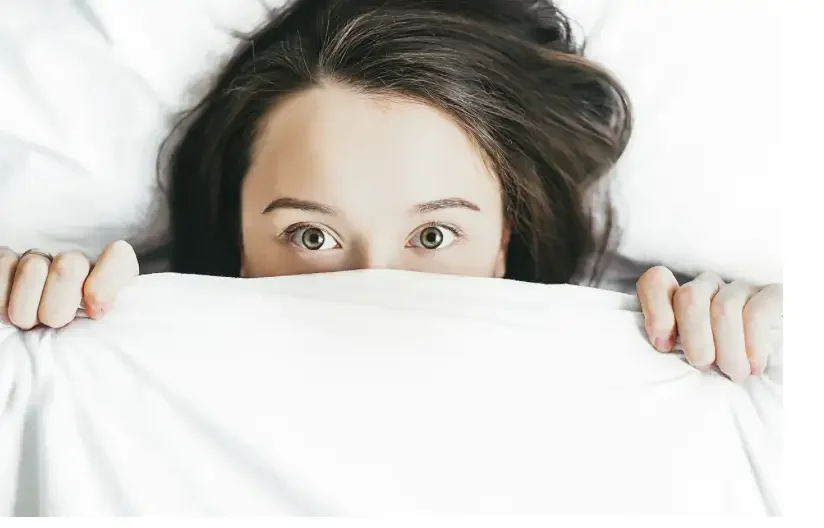Sleep Hygiene Tips for When You’re Feeling Anxious
t’s the end of the day. You’re exhausted, you’ve been thinking about curling up in bed and falling asleep all day—but the moment your head hits the pillow, your mind turns on. Worries loop. To-do lists expand. You scroll your phone, hoping to get sleepy, but instead feel more awake. Sound familiar?
If you’re someone who experiences anxiety or trauma, it’s likely you’ve also struggled with sleep. Anxiety and sleep problems often go hand in hand, creating a frustrating cycle: the less you sleep, the more anxious you feel—and the more anxious you feel, the harder it is to sleep.
The good news? Improving your sleep hygiene—the habits and environment that support quality rest—can help calm your nervous system and create the conditions for deeper, more restorative sleep.
Why Anxiety Affects Sleep
Anxiety activates the body’s fight-or-flight system, also known as your sympathetic nervous system. Your heart rate increases, your thoughts race, and your body prepares for danger—even if there’s no immediate threat. That’s the exact opposite of the parasympathetic nervous system, the “rest and digest” state needed for sleep.
If you’ve ever felt tired but wired, it’s likely your body was holding onto stress hormones like cortisol and adrenaline, which interfere with the body’s natural sleep cycle.
While you may not be able to control anxious thoughts completely, you can shift your habits to support better rest.
8 Therapist-Recommended Sleep Hygiene Tips for Anxiety
1. Create a wind-down routine
Give your brain cues that it’s time to rest. A consistent wind-down routine—like dimming lights, turning off screens, and doing calming activities—can help your nervous system settle. Try reading, stretching, or listening to soft music 30–60 minutes before bed.
2. Go to bed and wake up at the same time every day
Even on weekends. Even if you stayed up late and have to get up early. A consistent sleep schedule trains your circadian rhythm (your internal clock), making it easier to fall asleep and wake up naturally.
3. Cut back on screen time at night
You’re kidding me right? You mean doom-scrolling isn’t helpful? The blue light from phones and tablets suppresses melatonin, the hormone that makes you sleepy. Try setting a “digital sunset” at least 1 hour before bed—or use blue light filters if you can’t unplug.
4. Limit stimulants and alcohol
Caffeine, nicotine, and even alcohol can disrupt your ability to fall or stay asleep. Try cutting off caffeine by early afternoon and limiting alcohol before bed, as it can interfere with REM sleep. Alcohol actually has a rebound effect on our bodies and while it can help you to relax and unwind, alcohol too close to bed. Because alcohol depresses the central nervous system, your body compensates by increasing excitatory chemicals (like glutamate) and reducing calming ones (like GABA). Once the alcohol leaves your system, this overcompensation can cause symptoms like anxiety, restlessness, and trouble sleeping, —especially after heavy or repeated drinking. It’s essentially your nervous system “bouncing back” too far in the opposite direction. Caffeine also has a surprisingly long half-life, which means that it stays in our systems longer than we may think.
5. Try a body-based relaxation technique
Anxiety lives in the body, not just the mind. Practices like progressive muscle relaxation, rectangle breathing, or a guided body scan can cue your nervous system to shift from fight-or-flight to rest-and-digest.
6. Create a calming sleep environment
Your bedroom should feel like a retreat. Aim for cool, dark, and quiet. Consider blackout curtains, a white noise machine, or a weighted blanket. Clear clutter, and make your bed a phone-free zone if possible.
7. Avoid lying in bed awake for too long
If you can’t fall asleep after 20–30 minutes, try getting up and doing a calming activity like reading or stretching in dim light. It may also be helpful to do something mindless, like folding laundry. This helps your brain avoid associating your bed with anxiety or wakefulness.
8. Jot your worries down before bed
If racing thoughts keep you up, try a simple brain dump: write down what’s on your mind—no judgment, just getting it out. You can also keep a “worry journal” or to-do list beside your bed to revisit in the morning.
When to Seek More Support
If your anxiety and sleep difficulties are chronic or impacting your quality of life, you’re not alone—and help is available. Therapy can offer tools to address both the root of your anxiety and the habits that disrupt rest.
Modalities like Mindfulness, Yoga-Infused Therapy, EMDR, or somatic approaches can be especially effective for restoring sleep and nervous system regulation.
You deserve rest.
Sleep isn’t just a luxury—it’s essential for emotional regulation, focus, and healing. With some gentle shifts in your routine and environment, even anxious nights can become more restful.

